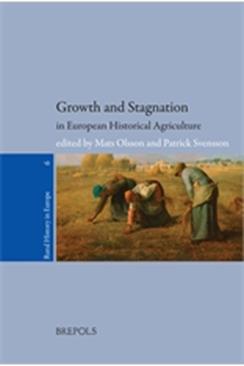Publications | Rural History in Europe
Growth and Stagnation in European Historical Agriculture
Agricultural production has been the basic and single most important factor for the well-being of mankind since the Neolithic revolution. Insufficient agricultural output has led to deficient means of subsistence and sometimes even starvation, while rich harvests brought about plenty and prosperity. Continuous increases in agricultural output have transformed whole societies and continents, bringing about radical changes in people’s lives and economic prospects.
This book is focused on measuring and explaining agricultural growth in Europe. For most countries statistics on agricultural production are either non-existing or shaky for the period up to the end of the nineteenth century. Consequently, researchers dealing with historical farming have been forced to put a lot of effort into reconstructing reliable data on inputs and outputs. The last decades have seen major progress, and new approaches to quantify and explain agricultural development have been adopted. The book is the result of these efforts and it encompasses estimations and explanations of European historical agriculture over time, from the ninth to the twentieth century, and over space, from the Iberian Peninsula to Scandinavia and from the British Isles to Russia.
LIST OF CONTRIBUTORS
John BECKETT, University of Nottingham, United Kingdom
Ernesto CLAR, University of Zaragoza, Spain
Giovanni FEDERICO, European University Institute, Florence, Italy
Helder Adegar FONSECA, University of Évora, Portugal
Merijn KNIBBE, Wageningen University, Netherlands
Frank KONERSMANN, Bielefeld University, Germany
José-Miguel LANA-BERASAIN, Public University of Navarre, Spain
Carol S. LEONARD, University of Oxford, United Kingdom
Mats OLSSON, Lund University, Sweden
Vicente PINILLA, University of Zaragoza, Spain
Jaime REIS, University of Lisbon, Portugal
Patrick SVENSSON, Lund University, Sweden
Michael TURNER, University of Hull, United Kingdom
Alexis WILKIN, Université Libre de Bruxelles, Belgium
 Actualités
Actualités
Les intermédiaires dans la relation de travail dans les sociétés esclavagistes et post-esclavagistes, XVe siècle à nos jours
 Appel à communication - Samedi 1 mars 2025 - 18:00ArgumentaireDans la vaste question du travail contraint et forcé, les intermédiaires, placés à l’intersection des statuts de libre, d’esclave ou d’engagé, jouent un rôle central, quoique relativement négligé par l’historiographie. Ce numéro 'Esclavages & post~esclavages / Slaveries & Post~Slaveries (n°13, 2026, CIRESC), dirigé par Alessandro Stanziani (GRHEN), propose d’exposer leurs situations dans le long terme, du moment de la traite à cel(...)
Appel à communication - Samedi 1 mars 2025 - 18:00ArgumentaireDans la vaste question du travail contraint et forcé, les intermédiaires, placés à l’intersection des statuts de libre, d’esclave ou d’engagé, jouent un rôle central, quoique relativement négligé par l’historiographie. Ce numéro 'Esclavages & post~esclavages / Slaveries & Post~Slaveries (n°13, 2026, CIRESC), dirigé par Alessandro Stanziani (GRHEN), propose d’exposer leurs situations dans le long terme, du moment de la traite à cel(...)
Hugo Souza de Cursi, lauréat de la bourse d'aide à publication de l'IDA 2024
Prix et distinctions -L’ appel à publication de thèses lancé par l’Institut des Amériques (IDA) a vocation, chaque année, à attribuer une aide financière à de jeunes docteurs en sciences humaines et sociales dans le cadre de projets de publication de leur thèse. Les thèses récompensées abordent des thématiques en lien avec les Amériques.Parmi les trois projets retenus dans le cadre de l’appel lancé par l’IDA pour l’année 2024, et soumis à l’acceptation définitive des Presses universitaires d(...)
Prix de la pensée européenne 2024
Prix et distinctions -Le premier prix de la pensée européenne, créé par des intellectuels engagés, a été remis le 16 mars 2024 à Conques, dans l’Aveyron. L’objectif est de promouvoir un idéal démocratique européen qui réponde aux enjeux environnementaux et sociaux du monde.Associé à un colloque de fond "Le réveil de la pensée européenne ?" qui sest déroulé les 16 et 17 mars au Centre européen de Conques (retransmis en direct avec Philosophie Magazine), et présidé par le philosophe Dominique(...)
ERHIMOR
EHESS-CRH
54 boulevard Raspail
75006 Paris
Tél. : +33 (0)1 49 54 24 42
ou : +33 (0)1 49 54 25 74
Fax : +33(0)1 49 54 23 99
Dernière modification :
18/04/2018



